Emerson UnCommon game results released
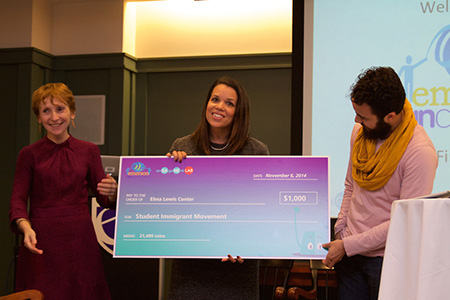
Donna Heiland, special assistant to President Lee Pelton, and Kelly Bates, founding director of the Elma Lewis Center, present a $1,000 check to Carlos Rojas-Alvarez of the Student Immigration Movement. The organization was a top charitable cause selected by Community PlanIt: Emerson UnCommon players. (Photo by Nick Eaton ’17)
The organizers of Community PlanIt: Emerson UnCommon, an online game that garnered thousands of comments from the Emerson community to assist the College in its strategic planning, released results in a wrap-up ceremony on November 6 in the Beard Room of the Little Building.
Nine hundred and seventy-four Emerson community members participated in the game, with 563 of them designated as “active players.”
There were 8,292 comments generated from Emerson students, faculty, staff, and alumni about a wide range of College-related issues, which are being analyzed by College officials to aid in large-scale planning.
The Community PlanIt game platform, which was designed by Emerson’s Engagement Lab, has launched similar games to aid in municipal and regional planning processes worldwide since 2010. Emerson UnCommon was the first time Community PlanIt was used by a college for strategic planning purposes.
Emerson President Lee Pelton thanked players at the event, calling the game “a wonderfully creative and inventive project.”
“We really are a commonwealth of learning,” Pelton said. “I like that word [commonwealth] better than community because I think it speaks to the investment that we all make…we all have some responsibility.”
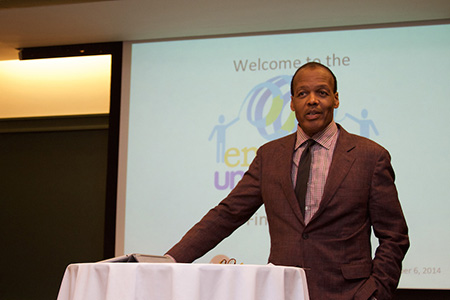
President Lee Pelton at the November 6 Emerson UnCommon event. (Photo by Nick Eaton ’17)
Pelton said Emerson UnCommon allowed the College to hear directly from community members to aid in the strategic process, and to help the College better understand community members’ interests. “From what I can tell, we’ve done a great job in both of those respects,” he said.
Michaele Whelan, chief academic officer, said she received a lot of valuable feedback from students.
“When we decided to play, I wanted to know, what are we going to discover about Emerson as a learning environment?” she said. “I thought it’d be helpful to see what kinds of learning experiences are most engaging and challenging.”
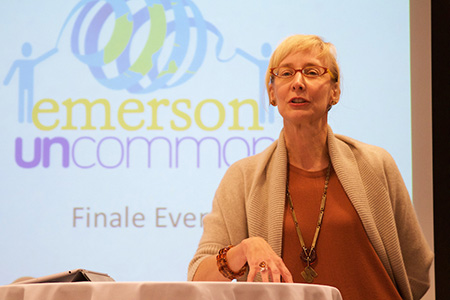
Michaele Whelan, chief academic officer, speaks at the Emerson UnCommon wrap-up event November 6. (Photo by Nick Eaton ’17)
Many students said they learn better through peers after sharing concepts learned in the classroom, Whelan said, while others said they gained valuable knowledge from classes outside of their majors.
One student commented that she appreciated Performing Arts faculty treating students “like future coworkers.”
“We have to think about what these voices are telling us about our learning community,” Whelan said.
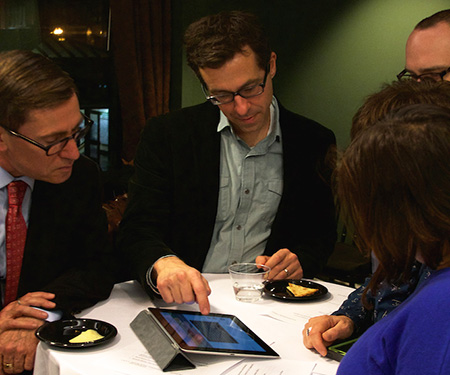
Eric Gordon, executive director of the Engagement Lab (center) shows Bob Fleming, executive director of the Iwasaki Library (left) and staff members new tools the lab is working on using his iPad. (Photo by Nick Eaton ’17)
A major aspect of Emerson UnCommon was that players earned coins and could create campaigns to support charitable causes in the Boston community.
The top three causes selected, which received a $1,000 donation each from Community PlanIt, were Therapy Dogs for Finals (campaign created by the Iwasaki Library and Emerson Student Accessibility Services); the Student Immigration Movement (campaign created by the Elma Lewis Center for Civic Engagement, Learning, and Research); and the Interactive Online History of Emerson (campaign created by the Iwasaki Library), which involves the Iwasaki Library staff producing an interactive online history of Emerson with collaboration from faculty and students.
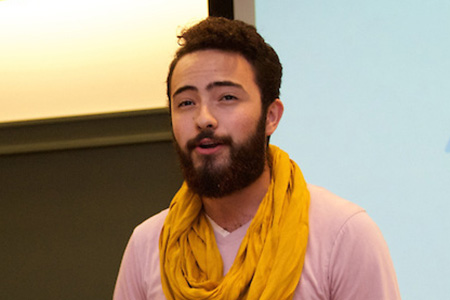
Carlos Rojas-Alvarez of the Student Immigration Movement. (Photo by Nick Eaton ’17)
Carlos Rojas-Alvarez of the Student Immigration Movement, which advocates for educational access for undocumented immigrants, accepted the $1,000 donation after an introduction from Kelly Bates, founding director of the Elma Lewis Center. Rojas-Alvarez, who was born in 1993, shared his story of fleeing Colombia with his mother at about 5 years old after his uncle was murdered by guerillas.
“Over the past few months, the Emerson community has really backed the immigrant youth movement in ways that we’ve never seen before,” said Rojas-Alvarez, “and in ways that a [college] typically doesn’t do. That’s been really inspirational.”
Categories